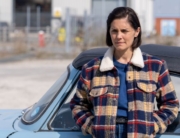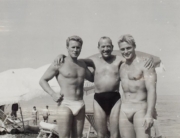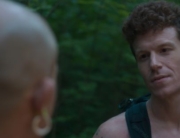In Mikko Mäkelä’s smooth, subdued drama, Max (Ruaridh Mollica), a 25-year-old up-and-coming writer in London, moonlights as a sex worker. He relays his hook-ups in the third person vis-à-vis a character named Sebastian (the pseudonym Max uses as well in his secret life as an escort) in the debut novel he is crafting. A recently published short story has already earned Max acclaim and national attention as a promising young voice. When he shares his work-in-progress in workshops and with his publisher, his audience is amazed by his specificity, thinking he researched his subject matter, rather than living it.
Because Max is reticent, taciturn, with somewhat halting speech patterns, it can be unclear what his motivations are. Is Max going on these escapades to quell loneliness, to mine fodder for his novel, of which he so desperately longs to have published at a young age? Is he attracted to his clients, who are mostly much older than him? Max’s stony, placid face expresses little undercurrents of emotion. All of this is well modulated by Mollica, whose character seems to be swelling with contradictions and internal yearnings.
When I first caught Sebastian at the Provincetown Film Festival this summer, Mäkelä noted in his introduction that he wanted to make a movie that didn’t “problemize sex.” There have been many tales about sex where the main character spirals into a hellish abyss, ending up rock bottom. Besides keeping Max’s motivations and feelings mostly at bay, it’s refreshing, too, to witness such a plain, straightforward portrait of queer sex work. In fact, the film detours most dramatically, in part, through the advice of Max’s quietly calculating publisher, who wants a more devastating conclusion for Max’s “digital hustler.” It’s the ending the audience wants, she suggests.
This, perhaps in turn, steers Max away from a blooming relationship with erudite academic Nicholas (Jonathan Hyde, in a believable, sensitively drawn performance) toward a more volatile existence. Because Max reminds Nicholas of a former lover, who recently departed after a lengthy relationship, there’s a ghostliness that hovers over their relationship, and because Nicholas is so kind and giving, a sweetness.
Because of the film’s ambiguous underpinnings and its portrait of tenuous lines drawn between one’s fiction and one’s autobiography, it makes sense why Bret Easton Ellis is evoked here, and as an author Max desperately wants to interview for his side gig at a literary magazine. Unlike Easton Ellis, Mäkelä’s script isn’t riven with sparkly dialogue nor sweeping experiences. In fact, the whole affair teeters at times on feeling bland. Yet, it’s assuredly directed, as well as deftly shot by Iikka Salminen. The differences are subtle, but Salminen’s cinematography sometimes exudes a colder, washed-out quality, in contrast to the warm, golden, rich darker tones of scenes between Max and Nicholas. The sound mix—with its sex, city rumblings, and booming music—is particularly sharp and atmospheric.
Sebastian observes aspects of narcissism, ambition, and the role of the artist in modern, consumer culture. None are explored with much complexity or depth, but instead as tiny pricks that gnaw at Max’s psyche and sense of identity, leaving the viewer uneasy and unnerved by his journey.







Leave A Comment